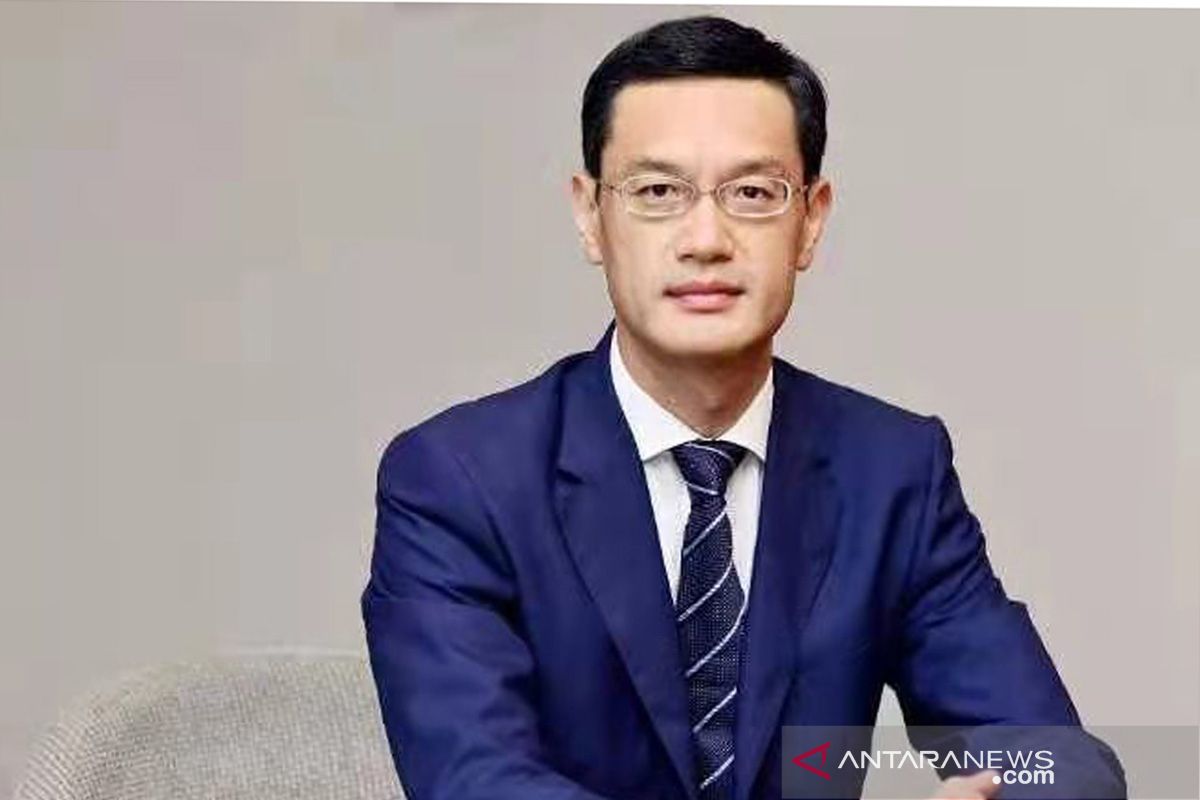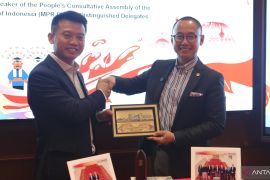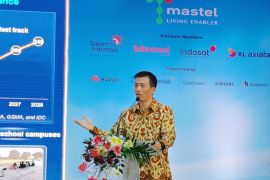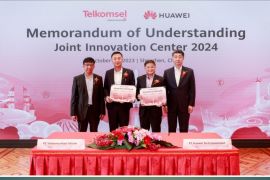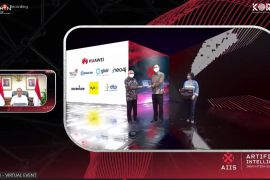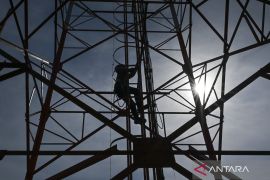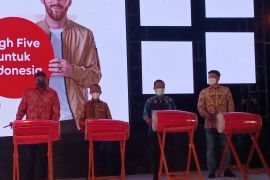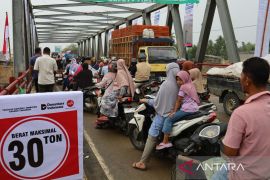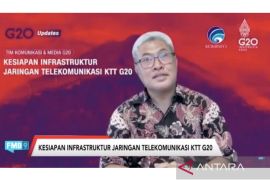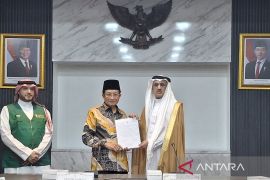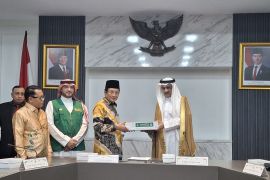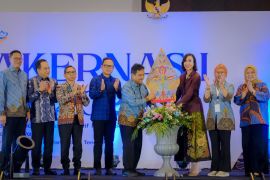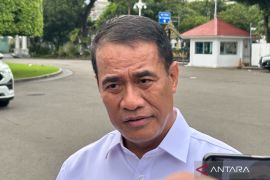In its partnership with Indonesia, the company, founded in Shenzhen, Guangdong Province, China, in 1987, has additionally assisted in creating 500 startups and MSMEs operating in 15 sectors, so that they can create a total of 20 thousand jobs. Huawei has PT Telkomsel and XL Axiata as its two strategic business partners in Indonesia.
Since January 2021, Huawei has opened the Huawei ASEAN Academy Engineering Institute and has collaborated with 33 leading universities in Indonesia. The program has benefited 12 thousand technicians and seven thousand students in the country.
ANTARA Beijing Bureau had the opportunity to conduct an exclusive interview with Vice President of Huawei for the Asia-Pacific Region Jay Chen at the Mandarin Oriental Hotel, Beijing, on Wednesday (Mar 10) evening. Here is the transcript of the interview conducted in English:
ANTARA: Hi, how are you? Nice to meet you.
Jay Chen: I am good. I heard that during these weeks, you have been very busy covering Lianghui (Two-Session Parliamentary Annual Session in Beijing). I am glad you could still find the time to interview me. Moreover, you are the only media representative from Indonesia in China.
ANTARA: Ha...ha...
Jay Chen: Let's sit down first. (Engage in light discussion at the hotel restaurant in the Wangfujing area, one of the busiest business districts in central Beijing)
ANTARA: Huawei has been in Indonesia for 20 years. What experiences can you share in contributing to Indonesia's development?
Jay Chen: The first time I visited Indonesia was in 2000. I still remember, one night in Jakarta, I saw some buildings shining brighter (with the lamps) than those in Beijing. The road conditions were also better. Thereafter, on the second day, I took a walk thinking that this country is big in the telecommunications industry. The population is large, and there are also many young people. At that time, scores of people were using Nokia mobile phones. Almost everyone used them. It helped me think that this country has great potential in the telecommunications industry sector.
ANTARA: Did you come [for the first time to Indonesia] in 2000?
Jay Chen: Yes. At that time, people were still using Nokia but not the smartphone ones. Everyone was on cell phones. Young people used it. The driver also used it. There were businesspersons, who used Blackberry. At that time, it was still GSM 2G. However, at that time, the situation in Jakarta was truly beautiful.
ANTARA: What happened next?
Jay Chen: Gradually, the ICT industry has been progressing little by little. Later on, I sent a team (to explore the market in Indonesia). We are aware that this country has the potential to become a strategic market for us in the Asia-Pacific region, so that in the next 20 years, we will make Indonesia our most important partner in the information and communication technology industry. Almost all telecommunication operators in Indonesia have become our partners. We also provide telecommunication networks based on 2G, 3G, and 4G. We also provide a transmission network that forms the backbone of this industry.
ANTARA: How far has Huawei's business grown in Indonesia?
Jay Chen: We kept growing in this market. We have provided basic networks serving more than 70 percent of the population in Indonesia. We have introduced information and communication technology to the Indonesian market.
ANTARA: What have you done to cultivate quality human resources?
Jay Chen: We provide training to the local talent, so that this upgrades the quality of human resources in Indonesia to grow along with Huawei.
Network services and fulfillment of basic telecommunication requirements as well as the transfer of new technology to the local ICT talent continue to grow. All of them have had very positive values in the last 20 years.
Now, we are also developing telecommunications infrastructure. Huawei is also a cloud industry (computer digitization system to meet the needs of several industrial sectors).
ANTARA: What are your expectations for the coming years?
Jay Chen: We always rely on our industry partners in Indonesia. We also want to contribute to Indonesia in the long term. Hence, we have a long-term strategic plan in Indonesia, so that we can continue to contribute to long-term development.
ANTARA: Is there anything concrete?
Jay Chen: What you should know is that our business has been growing and dynamic. We can create a business climate, trade, and now, we have been building a new business, the Cloud Business in Indonesia. We always transform ourselves, so that we could make more social contributions. Since last year, we have allocated human resources to run a program called the ICT Talent Program. We are partnering with the Indonesian government, so that in five years, we are able to train a young talent pool of one lakh people through the program meant only for Indonesians. We launched this program last year through the signing of an MoU with the Indonesian government (Presidential Office/KSP). This program is not only for technicians but also for those from universities, government staffers, and the general public.
(In supporting the acceleration of digital education transformation, Huawei has signed an MoU with the Directorate General of Higher Education, Ministry of Education, and Culture of the Republic of Indonesia to provide remote training in the field of cloud computing to one thousand students from 500 universities in Indonesia)
ANTARA: What are the prospects for the 5G business in Indonesia?
Jay Chen: We really understand that currently, the Indonesian government is still focusing on developing 4G networks in several areas in order to offer better telecommunication quality in those areas. However, before that, we will first focus on the 4G network, so that it can cover remote areas with even better quality. We also focus on cultivating the ICT talent, so that they can become familiar with 4G first and later, of course, with the 5G technology.
(PT Telkomsel and Huawei Indonesia are implementing the BAKTI program of the Ministry of Communication and Information of the Republic of Indonesia to present a 4G LTE network in the outer regions of Indonesia. Through this synergy, Telkomsel and Huawei made a network transition from 2G to 4G in Sumatra and Nusa Tenggara islands)
ANTARA: What are benefits and advantages of the 5G network?
Jay Chen: In fact, 5G is not only to benefit individuals, but in time, 5G will be very important for industries, such as health, education, manufacturing, transportation, and agriculture. To be sure, 5G is really needed for the industrial sector.
ANTARA: Can you mention some examples?
Jay Chen: You need to know, before 5G, there were 4G, 3G, and 2G that could only be used for individual needs, such as for making phone calls, internet connection, and for uploading and downloading data and image content.
However, 5G is much more important for the industry. I give you an example. Yangshan Port in Shanghai is the biggest port. Its annual capacity can reach 13 million containers. This is only one port. Perhaps, Yanghsan’s capacity is the same as India’s total annual capacity. Hence, just one port has the same capacity as that of one country. This port uses 5G-based technology that runs all control systems automatically, including its management control.
This 5G technology is also used in the transportation and medical service industry sectors, such as at hospitals. That is why 5G is very important.
We will also give an example that in China, I am sure you will know, every year in the province of Shanxi, various accidents take place in the mining area, in the coal mine, and last month, (accidents also took place) in a gold mine in Shandong Province.
Shanxi has five thousand coal mines, and accidents did often occur. This is a big problem. The government is very serious about this issue, especially regarding regulation and mine safety that has yet to be made available for mine workers.
However, after the 5G deployment, we used mining automation, and we used underground cameras. The workers only control remotely from their office. They can control anything through the camera, including the drilling. Today, there are no more underground miners owing to the application of the 5G network.
Huawei plays an important role in China in the mining industry, so that it can reduce the number of people working in the mining area. There are no more people working underground, and everyone works from the office. That is the reason why 5G should be applied. We need time to prepare for this in Indonesia. This is our main concern.
ANTARA: How is Huawei's business development in Indonesia, especially in the business group?
Jay Chen: CBG is a new business in Huawei to develop cloud business in the future. We understand that this is very important for the Indonesian government as well as for the internet-based business and e-commerce players.
India has made major changes in this sector. We will apply it in Indonesia since we see a large population dominated by youngsters. We are highly optimistic of many new unicorns and bi-corns arising from internet companies in Indonesia through the network that I provide. Later, many start-up companies can develop their businesses. Hence, we are very focused on investing in this field in Indonesia.
All of us firmly believe that Indonesia is a strategic market, so our investment in this market is very large. We are also optimistic of facilitating the Indonesian government in terms of digital transformation.
ANTARA: How do you view the Indonesian government's plan to build a new capital?
Jay Chen: If I am not mistaken, we heard that the program is still temporarily suspended. However, if the program is continued, of course, we will have a positive role in that. We are very confident that we can contribute with our global experience in the new capital city.
ANTARA: What is Huawei's contribution during the pandemic?
Jay Chen: This is a very good question. During the pandemic, apart from Indonesia, we also contributed to all other countries in the Asia-Pacific region. We are working very hard to provide assistance. During the pandemic, we provided microwave transmissions on a remote island in Indonesia since there was no fiber optic cable network available. We provided a reliable telecommunication network for the Indonesian government to conduct emergency response on the isolated island.
Second, we provided assistance to the Diamond Princess cruise ship that was docked off the Japan coast after a passenger tested positive for COVID-19 in early February of 2020.
We provided communication network for the people aboard the ship.
We also provided networks at several hospitals. We helped doctors find solutions and fast treatments for patients infected with COVID-19.
In addition, we provided masks and other medical supplies to several countries. The most important thing is that we had to provide internet facilities since during this pandemic at least 50 work tasks are now required to be conducted online.
(Huawei also supported PT Telkom and the Indonesian Navy in building telecommunications infrastructure on Sebaru Island to provide adequate support for 260 cruise ship workers quarantined aboard the Diamond Princess cruise ship and World Dream cruise ship. Huawei provided Wi-Fi 6 at the Gatot Subroto Army Hospital and provided artificial intelligence technology at the Pertamina General Hospital).
ANTARA: What assistance has ever been provided by Huawei, especially for Indonesia?
JayChen: This is another very interesting aspect for us.
Indonesia is the world’s largest archipelagic country, and every year, natural disasters, such as earthquakes, floods, and volcano eruptions, occur. We always sent teams to disaster-affected regions to undertake relief efforts. Our teams are always working hard to do it. Hence, this is what we have done until now in Indonesia.
About Jay Chen:
Jay Chen joined Huawei in 2000, and during that year, he also visited Jakarta. Before being appointed as Huawei's VP for the Asia-Pacific region, the father of two sons and a daughter was the CEO of Huawei in India. During his term in India, the executive, who completed his master’s degree from the East China Normal University in Shanghai, was known to have close relations with the media. Related news: Huawei: 5G adoption faster than expected in industrial processes
Related news: Huawei Indonesia Introduces the Intelligent Twins
Reporter: M. Irfan Ilmie/Yashinta Difa
Editor: Rahmad Nasution
Copyright © ANTARA 2021
